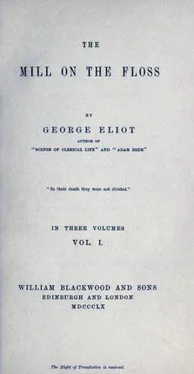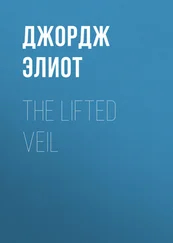"Good God, Maggie!" said Stephen, rising too and grasping her arm, "you rave. How can you go back without marrying me? You don't know what will be said, dearest. You see nothing as it really is."
"Yes, I do. But they will believe me. I will confess everything. Lucy will believe me — she will forgive you, and — and — oh, some good will come by clinging to the right. Dear, dear Stephen, let me go! — don't drag me into deeper remorse. My whole soul has never consented; it does not consent now."
Stephen let go her arm, and sank back on his chair, half-stunned by despairing rage. He was silent a few moments, not looking at her; while her eyes were turned toward him yearningly, in alarm at this sudden change. At last he said, still without looking at her,–
"Go, then, — leave me; don't torture me any longer, — I can't bear it."
Involuntarily she leaned toward him and put out her hand to touch his. But he shrank from it as if it had been burning iron, and said again,–
"Leave me."
Maggie was not conscious of a decision as she turned away from that gloomy averted face, and walked out of the room; it was like an automatic action that fulfils a forgotten intention. What came after? A sense of stairs descended as if in a dream, of flagstones, of a chaise and horses standing, then a street, and a turning into another street where a stage-coach was standing, taking in passengers, and the darting thought that that coach would take her away, perhaps toward home. But she could ask nothing yet; she only got into the coach.
Home — where her mother and brother were, Philip, Lucy, the scene of her very cares and trials — was the haven toward which her mind tended; the sanctuary where sacred relics lay, where she would be rescued from more falling. The thought of Stephen was like a horrible throbbing pain, which yet, as such pains do, seemed to urge all other thoughts into activity. But among her thoughts, what others would say and think of her conduct was hardly present. Love and deep pity and remorseful anguish left no room for that.
The coach was taking her to York, farther away from home; but she did not learn that until she was set down in the old city at midnight. It was no matter; she could sleep there, and start home the next day. She had her purse in her pocket, with all her money in it, — a bank-note and a sovereign; she had kept it in her pocket from forgetfulness, after going out to make purchases the day before yesterday.
Did she lie down in the gloomy bedroom of the old inn that night with her will bent unwaveringly on the path of penitent sacrifice? The great struggles of life are not so easy as that; the great problems of life are not so clear. In the darkness of that night she saw Stephen's face turned toward her in passionate, reproachful misery; she lived through again all the tremulous delights of his presence with her that made existence an easy floating in a stream of joy, instead of a quiet resolved endurance and effort. The love she had renounced came back upon her with a cruel charm; she felt herself opening her arms to receive it once more; and then it seemed to slip away and fade and vanish, leaving only the dying sound of a deep, thrilling voice that said, "Gone, forever gone."
Book VII. The Final Rescue
Chapter I. The Return to the Mill
Between four and five o'clock on the afternoon of the fifth day from that on which Stephen and Maggie had left St. Ogg's, Tom Tulliver was standing on the gravel walk outside the old house at Dorlcote Mill. He was master there now; he had half fulfilled his father's dying wish, and by years of steady self-government and energetic work he had brought himself near to the attainment of more than the old respectability which had been the proud inheritance of the Dodsons and Tullivers.
But Tom's face, as he stood in the hot, still sunshine of that summer afternoon, had no gladness, no triumph in it. His mouth wore its bitterest expression, his severe brow its hardest and deepest fold, as he drew down his hat farther over his eyes to shelter them from the sun, and thrusting his hands deep into his pockets, began to walk up and down the gravel. No news of his sister had been heard since Bob Jakin had come back in the steamer from Mudport, and put an end to all improbable suppositions of an accident on the water by stating that he had seen her land from a vessel with Mr. Stephen Guest. Would the next news be that she was married, — or what? Probably that she was not married; Tom's mind was set to the expectation of the worst that could happen, — not death, but disgrace.
As he was walking with his back toward the entrance gate, and his face toward the rushing mill-stream, a tall, dark-eyed figure, that we know well, approached the gate, and paused to look at him with a fast-beating heart. Her brother was the human being of whom she had been most afraid from her childhood upward; afraid with that fear which springs in us when we love one who is inexorable, unbending, unmodifiable, with a mind that we can never mould ourselves upon, and yet that we cannot endure to alienate from us.
That deep-rooted fear was shaking Maggie now; but her mind was unswervingly bent on returning to her brother, as the natural refuge that had been given her. In her deep humiliation under the retrospect of her own weakness, — in her anguish at the injury she had inflicted, — she almost desired to endure the severity of Tom's reproof, to submit in patient silence to that harsh, disapproving judgment against which she had so often rebelled; it seemed no more than just to her now, — who was weaker than she was? She craved that outward help to her better purpose which would come from complete, submissive confession; from being in the presence of those whose looks and words would be a reflection of her own conscience.
Maggie had been kept on her bed at York for a day with that prostrating headache which was likely to follow on the terrible strain of the previous day and night. There was an expression of physical pain still about her brow and eyes, and her whole appearance, with her dress so long unchanged, was worn and distressed. She lifted the latch of the gate and walked in slowly. Tom did not hear the gate; he was just then close upon the roaring dam; but he presently turned, and lifting up his eyes, saw the figure whose worn look and loneliness seemed to him a confirmation of his worst conjectures. He paused, trembling and white with disgust and indignation.
Maggie paused too, three yards before him. She felt the hatred in his face, felt it rushing through her fibres; but she must speak.
"Tom," she began faintly, "I am come back to you, — I am come back home — for refuge — to tell you everything."
"You will find no home with me," he answered, with tremulous rage. "You have disgraced us all. You have disgraced my father's name. You have been a curse to your best friends. You have been base, deceitful; no motives are strong enough to restrain you. I wash my hands of you forever. You don't belong to me."
Their mother had come to the door now. She stood paralyzed by the double shock of seeing Maggie and hearing Tom's words.
"Tom," said Maggie, with more courage, "I am perhaps not so guilty as you believe me to be. I never meant to give way to my feelings. I struggled against them. I was carried too far in the boat to come back on Tuesday. I came back as soon as I could."
"I can't believe in you any more," said Tom, gradually passing from the tremulous excitement of the first moment to cold inflexibility. "You have been carrying on a clandestine relation with Stephen Guest, — as you did before with another. He went to see you at my aunt Moss's; you walked alone with him in the lanes; you must have behaved as no modest girl would have done to her cousin's lover, else that could never have happened. The people at Luckreth saw you pass; you passed all the other places; you knew what you were doing. You have been using Philip Wakem as a screen to deceive Lucy, — the kindest friend you ever had. Go and see the return you have made her. She's ill; unable to speak. My mother can't go near her, lest she should remind her of you."
Читать дальше












